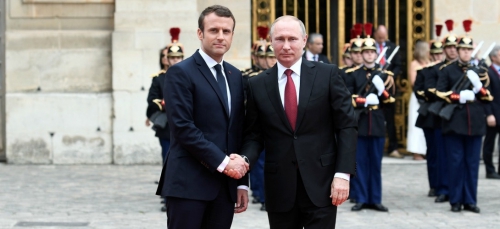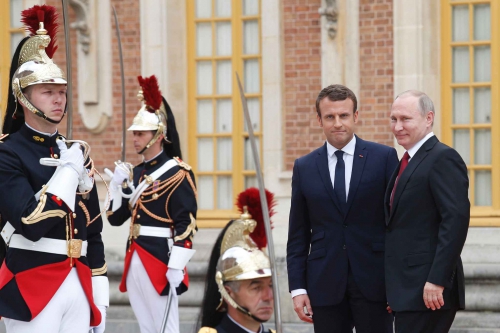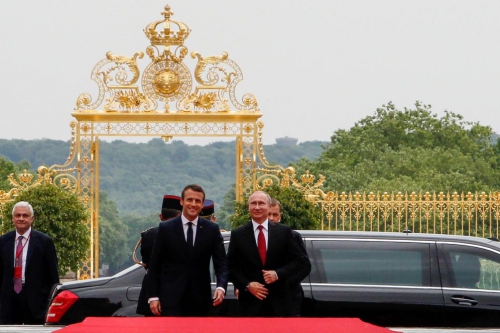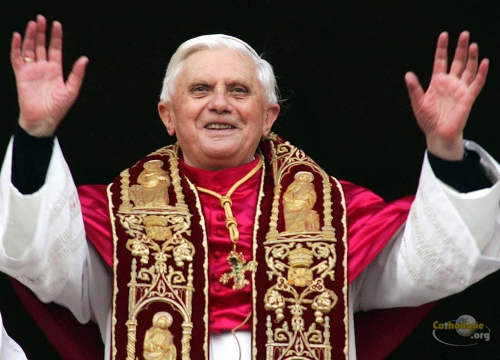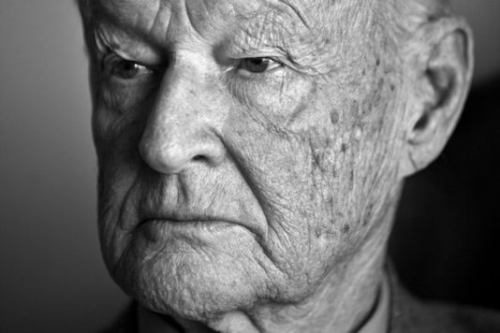La « prestigieuse » revue italienne de géopolitique revient sur les évènements du début 2013, qui ont en réalité commencé deux ans plus tôt.
Dans le n. 4 d’avril 2017, l’un des articles s’intitule « Pourquoi le Vatican nous sert ». Il est réservé aux abonnés, mais l’accroche annonce:
Tandis que l’Italie est une puissance régionale moyenne, la papauté déploie une influence mondiale. Quand les intérêts respectifs convergent, les politiques de Rome sont légitimées. Les problèmes surgissent si elles divergent, comme c’est le cas aujourd’hui pour la sécurité et l’accueil des migrants.
Et apparemment, comme ce fut le cas autour de 2013, où les intentions du Pape Benoît seraient entrées en conflit avec les intérêts de la faction la plus atlantiste du pouvoir italien (qui n’était pas celle représentée par le Premier ministre d’alors, Silvio Berlusconi, lui aussi contraint de démissionner par une campagne de scandales d’une violence inouïe).
Le sujet ne pouvait pas ne pas intéresser Antonio Socci, qui lui consacrait un article intéressant la semaine dernière.
Mais un peu plus tôt, le site Campari & de Maistre éclairait notre lanterne sur le contenu de l’article de Limes. Se gaussant de ce qu’il qualifie de « secret de Polichinelle ».
Campari & de Maistre
Démission de Benoît. Voici le secret … de Polichinelle
Nous vous invitons à lire tout l’article qui suit, non pas tant pour prendre acte de «ce qui» est révélé, mais de prendre acte de «qui» avalise ce point de vue.
«Les frictions entre l’Eglise et les Etats-Unis n’auraient pas disparu avec la disparition de Jean-Paul II. Elles auraient au contraire eu une suite dans le cours du pontificat du Pape Ratzinger, durant lequel elles n’auraient pas seulement été aiguisées par l’investissement de la part de Obama et de Hilary Clinton sur l’Islam politique des Frères Musulmans durant les dits « printemps arables », mais également par la ferme volonté de Benoît XVI de parvenir à une réconciliation politique avec le patriarche de Moscou, qui aurait été, dans ses intentions, le véritable couronnement religieux d’un projet géopolitique d’intégration euro-russe soutenu avec conviction par l’Allemagne et l’Italie de Silvio Berlusconi – mais pas de celle, plus pro-américaine, qui se reconnaissait en Giorgio Napolitano. Comment cela s’est terminé est connu de tous. Le gouvernement italien et la papauté auraient été frappés simultanément par une campagne de scandales, coordonnée, d’une rare violence et sans précédent, à laquelle se seraient associées des manœuvres plus ou moins opaques dans le domaine financier, avec l’effet final de précipiter en Novembre 2011 le retrait de Berlusconi du Palazzo Chigi, et le 10 Février 2013, l’abdication de Ratzinger. Au plus fort de la crise, l’Italie aurait vu progressivement se fermer les portes d’accès aux marchés financiers internationaux, tandis que l’Institut pour les œuvres de religion (IOR) serait coupé temporairement par le circuit Swift (4)».
Note
«(4) L’IOR aurait été exclu du système international des paiements du 1er Janvier au 11 Février 2013 sur la base de l’accusation de contribuer au blanchiment d’argent, avec l’effet d’induire la Deutsche Bank à bloquer le fonctionnement des distributeurs automatiques de billets dans tout le territoire de la Cité du Vatican. La nouvelle a été donnée en Italie par la Repubblica du 3 Janvier 2013, quand Fabio Tonacci publia un article intitulé: « Vatican, stop aux cartes et aux distributeurs automatiques de billets. Les services de paiement suspendus ». Le lendemain de l’annonce de l’abdication du pape Ratzinger, le Saint-Siège obtiendra d’une banque suisse le rétablissement des services interrompus».
Après cette longue citation, désignons-en la source. Maurizio Blondet? Antonio Socci? Les hackers russes? Eh bien non, les données bibliographiques sont les suivantes: « Germano Dottori, Pourquoi nous avons besoin du Vatican » , dans Limes – revue italienne de géopolitique, n° 4/2017 (Avril), pp. 151-158″.
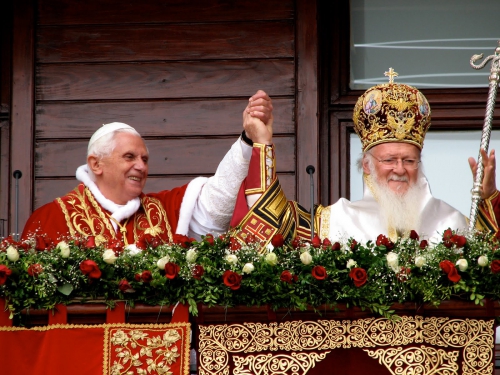
Bref, en lisant la dernière sortie du magazine italien qui fait autorité dans le domaine de la géopolitique, un journal auquel est attribué un rôle tel que chaque numéro est présenté, non sans une certaine solennité, par son directeur, à la télévision d’Etat, nous apprenons les informations suivantes:
1) Le succès politique des Frères musulmans (c’est-à-dire de l’islam fondamentaliste) à la suite des «printemps arabes» n’a pas été, comme beaucoup pourraient le penser, un effet non intentionnel du progressisme stupide de Obama mais quelque chose de voulu;
2) Benoît XVI a poursuivi avec «une ferme volonté» le plan de réconcilier l’Eglise catholique avec le Patriarcat de Moscou;
3) Ces deux facteurs ont aiguisé les frictions entre l’Eglise et les États-Unis, commencées dans la dernière phase du pontificat de saint Jean-Paul II;
4) Le gouvernement Berlusconi soutenait le dessein de Benoît XVI dans une optique pro-russe;
5) Il s’est ainsi aliéné les sympathies des Américains, dont l’homme, en Italie, n’était autre que le Président de la République Giorgio Napolitano;
6) Les campagnes à scandales simultanées subies durant ces années par Berlusconi et le pape Benoît XVI étaient coordonnées entre elles, destinées à frapper deux personnalités qui, dans l’optique des États-Unis, étaient ouvertement trop pro-russes et très peu obéissantes à la Maison Blanche;
7) Cette campagne de dénigrement s’est accompagnée de manoeuvres financières opaques à la fois contre l’Italie (vous vous souvenez du « spread »?), et contre le Vatican (confirmant ce qui avait déjà été laissé à entendre par d’autres sources);
8) Tout cela a conduit à la démission de Berlusconi (et jusque là, rien qui ne soit déjà notoire) et aussi, écoutez bien, à celle de Benoît XVI .
Enfin, last but not the least, « Limes » est depuis toujours publié par le même groupe d’édition que « la Repubblica », c’est-à-dire l’organe de presse qui a servi de « lanceur » à cette double campagne de scandales «coordonnée, d’une rare violence et sans précédent».
Bref, eux, ils savent.
Que dire? Nous avons toujours voulu nous tenir à l’écart des polémiques de type «complot» à propos de ce qui est arrivé au cours des derniers moments du pontificat de Ratzinger et les explications complotistes sur sa démission. Nous ferons de même cette fois aussi. Nous nous limitons simplement à signaler ce que rapporte un magazine estimé et influent, qu’on ne peut certes pas accuser de proximité avec la «Kurie conservatrice» ou avec les «quatre chats» traditionalistes. Nous nous permettons de signaler le passage où il est dit: «Comment cela s’est terminé est connu de tous».
Autre chose qu’un «gomblot». Ici, il s’agit d’un secret de Polichinelle …
Paolo Maria Filipazzi
* * *
Commentaires d’Antonio Socci
Voilà que des experts géopolitique commencent à réfléchir à ce qui se cache derrière la mystérieuse «renonciation» de Benoît XVI
Dans le dernier numéro – qui vient de sortir – de Limes, la revue de géopolitique de référence du même groupe d’édition que la Repubblica et l’Espresso, est publié un essai par le professeur Germano Dottori, responsable des études stratégiques à la Luiss (Libera Università degli Studi Sociali), conseiller scientifique de Limes, membre d’autres importants centres d’études, et qui a été consultant auprès de commissions de la Chambre et du Sénat sur les affaires étrangères et la défense.
Donc, l’essai de Dottori – intitulé «Pourquoi nous avons besoin du Vatican» – retrace le lien étroit et décisif entre la politique étrangère de l’Etat italien et la présence à Rome de la papauté qui a une influence planétaire. Une relation conflictuelle.
CONFLIT
Aujourd’hui, par exemple, Dottori estime que «le gouvernement des flux migratoires» crée une grosse friction entre les intérêts de l’Etat italien et le Vatican du Pape Bergoglio .
Il est en effet bien connu que «François est un partisan des portes ouvertes», mais il y a une «difficulté structurelle destinée à peser sur l’Italie: si Rome ne tente pas de ralentir d’une façon quelconque le flux des désespérés qui atteignent notre pays, non seulement certains équilibres sociaux délicats seront sans doute compromis, comme on commence à le voir dans les banlieues … mais il est très probable que nos partenaires européens finiront par opter pour notre expulsion des accords sur l’espace européen unique, ce qui entraînera un préjudice pour les intérêts économiques considérables de nos exportateurs».
En décrivant les connexions complexe Italie / Vatican, Dottori s’est aussi arrêté sur les événements qui en 2011 ont conduit à la chute du gouvernement Berlusconi, et en 2013, à l’étrange et traumatique «renonciation» de Benoît XVI.
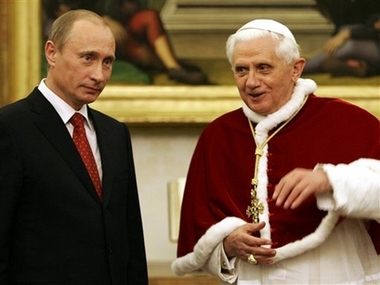
LE CONTEXTE
Dottore écrit: «les frictions entre l’Eglise et les Etats-Unis (…)
[Suit la citation du paragraphe évoqué plus haut]
Ce qui frappe, ce n’est pas seulement l’évocation du contexte géopolitique dans lequel se situe le «renoncement» de Benoît XVI (et la chute du gouvernement Berlusconi), mais aussi le fait que cette analyse soit publiée dans la revue de Lucio Caracciolo, «Limes», du groupe Gedi, dont le président est Carlo De Benedetti (le groupe de la Repubblica et l’Espresso) .
Il y a quelques mois, Dottori a donné une interview à l’agence catholique Zenit dans laquelle, interrogé sur les documents de WikiLeaks, il faisait cette considération: «Bien que je n’ai aucune preuve, j’ai toujours pensé que Benoît XVI avait été conduit à l’abdication par une machination complexe, ourdie par ceux qui avaient intérêt à bloquer la réconciliation avec l’orthodoxie russe, pilier religieux d’un projet de convergence progressive entre l’Europe continentale et Moscou. Pour des raisons similaires, je pense qu’a également été arrêtée la course pour succéder au cardinal Scola, qui en tant que patriarche de Venise avait mené les négociations avec Moscou» [voir à ce sujet: benoit-et-moi.fr/2016/actualite/laumonier-dobama].
GUERRE US À LA RUSSIE
Dans ces colonnes, j’ai souligné à maintes reprises la profonde anomalie de la «renonciation» du Pape Benoît, des circonstances dans lesquelles elle s’est produite, et enfin de sa décision de rester «pape émérite», expliquée avec ces mots surprenants: «Ma décision de renoncer à l’exercice actif du ministère ne révoque pas cela».
Une anomalie colossale qui fait penser à une demie-renonciation, comme on le devine aussi à partir de la fameuse conférence à la Grégorienne de son secrétaire Mgr Georg Gänswein.
Une telle «renonciation» doit être reliée au contexte géopolitique – comme le fait Dottori – sur lequel il conviendrait de réfléchir pour comprendre si d’éventuelles forme de pression furent exercées, et lesquelles.
Cela ne signifie pas que cette « renonciation » de Benoît XVI ait été extorquée ou contrainte. Mais cela signifie qu’autour de ce «choix» étrange, il y a un mystère colossal qui doit être éclairci.
Les considérations de Dottori sur Benoît XVI (et aussi sur le gouvernement Berlusconi) portent à nouveau à notre attention ce qui est – à mon avis – la clé pour comprendre de nombreux événements de ces dernières années: la guerre (froide et chaude) déclarée par les Etats-Unis d’Obama et Clinton contre la Russie de Poutine, sur tous les théâtres du globe.
Le projet d’un monde unipolaire à hégémonie américaine – qui doit donc balayer une Russie redevenue indépendante et autonome – est la dernière folie idéologique de la modernité .
C’est un projet impérialiste suicidaire pour les États-Unis et extrêmement dangereux pour le monde, mais il imprègne si profondément l’establishment américain (tant dans la faction « neocon » que celle « liberal ») que même Donald Trump – qui a gagné contre eux – doit maintenant transiger et se trouve fortement conditionné par ce bloc de pouvoir, qui semble plus fort que le président élu.
Libero, 17 mai 2017



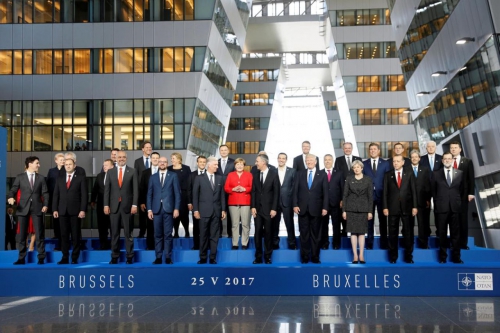

 del.icio.us
del.icio.us
 Digg
Digg